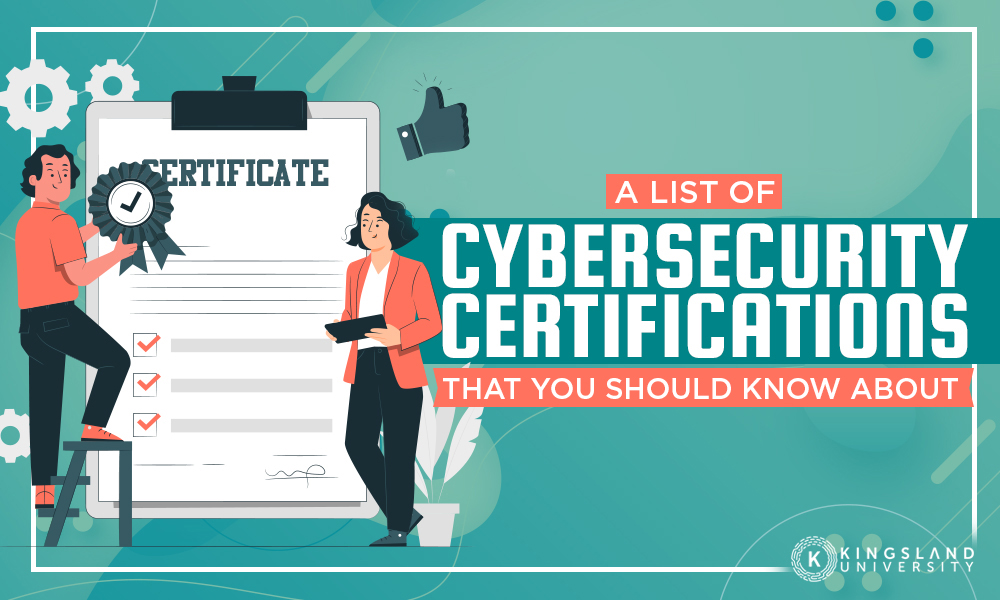
Getting employed as a cybersecurity professional can be tricky if you lack firsthand experience. Generally, the ideal situation is to have an education specific to computer science to make yourself both knowledgeable on the subject matter and an appealing candidate. However, your education and experience are not the sole factors when it comes to full-time employment. Certifications for advanced knowledge and authorization to practice certain cybersecurity functions have become both a supplement and sometimes a requirement in recent times for anyone seeking employment at a firm or company for the profession.
There are dozens of certifications available from just as many facilities and trainers to certify you, making it something of a challenge to know which are best suited to helping you professionally. With this article, we hope to give you insight into which cybersecurity certifications you should pursue and why.
What Are Certifications?
You might be wondering what certifications are at this point. You have likely heard of them, but maybe you were never sure what they were for or how they could help you professionally. Certifications are specialized credentials that you can earn by enrolling in the associated course and serves as a legitimate document to verify your competence to do a task or work a job.
To earn a certification, you are expected to complete a set amount of educational material and then pass a final assessment to verify that you have successfully completed the course material.

The reason certifications are so vital to prospective cybersecurity professionals is that they serve as proof of your skillset. By pursuing certification, you demonstrate a desire to expand your knowledge and skills to potential employers and prove that you can use certain programs and perform complex tasks. In the field of cybersecurity, certifications are becoming more and more of a necessity rather than a bonus as employers actively seek potential employees who have specifically sought-after certifications.
With all this in mind, it can be difficult to determine which certifications are worth your time to pursue. With so many cyber security-based certifications and so many places to take the necessary courses, it comes down to simply doing your research and determining which certifications suit your needs.
Certification #1: Certified Information Systems Security Professional (CISSP)
One of the most sought-after and popular certifications in the field, the Certified Information Systems Security Professional (CISSP) certification is ideal for anyone looking to become a professional cybersecurity agent. The main caveat of the CISSP certification is that it is an advanced certification that cannot be pursued by neophytes in the field but rather those who have pre-existing experience and education in computer science. The exact requirements are to have completed a minimum of 5 years of cumulative professional experience with at least 2 of the domains of security.
The CISSP lesson plan encompasses the eight domains of security: Security and Risk Management, Asset Security, Security Architecture and Engineering, Communication and Network Security, Identity and Access Management, Security Assessment and Testing, Security Operations, and Software Development Security.
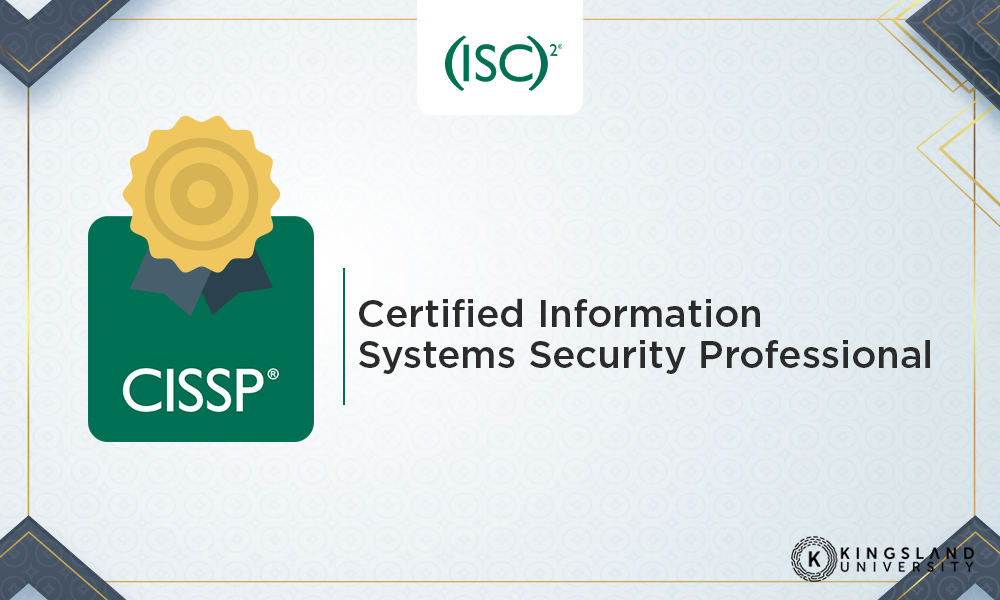
The exam itself is readily available worldwide, with the English version lasting about 3 hours with anywhere between 100 to 150 multiple choice and scenario questions. To pass the exam, you need to score 700 points out of 1,000, and, since 2018, the English exam is taken using Computerized Adaptive Testing (CAT) for a more precise scoring system.
One of the most common places to sign up for the course and register for the exam is on the (ISC)2 website which offers the course in English, Chinese, Japanese, French, German, Korean, Spanish, and Portuguese for an accessible lesson plan for people of all demographics. The average cost for the entire course is approximately $749.00 from start to finish. While this cost might seem exorbitant, it is well worth the cost.
Finally, the cybersecurity positions this certification is good for and their salaries are:
- Chief Information Security Officer with an average salary of $168,327.00 per year.
- Security Administrator with an average salary of $85,398.00 per year.
- IT Security Engineer with an average salary of $105,674.00 per year.
- Senior Security Consultant with an average salary of $118,208.00 per year.
- Information Assurance Analyst with an average salary of $85,746.00 per year.
The extensive course material for the CISSP certification and the positions it helps qualify for make it an extremely valuable certification. It requires a pre-existing investment in your career and education to accomplish but serves as an ideal transitioning point into a higher-tier position in cybersecurity.
Certification #2: Certified Information Systems Auditor (CISA)
The Certified Information Systems Auditor (CISA) certification is less extensive and, as a result, less demanding than the CISSP certification as it is more oriented toward general Information Technology (IT) training. This certification still requires some previous experience before you can get it for yourself. This certification requires a minimum of five years of professional experience in IT with the option to substitute one or two years with a 4-year degree.
The CISA course focuses on training you on Information System Auditing, Governance and Management of IT, Information Systems Acquisition, Development, and Implementation, Information Systems Operations and Business Resilience, and Protection of Information Assets.
The exam features 150 multiple choice questions that must be completed within 4 hours. The grading scale on the CISA exam is different from that of the CISSP exam, with the CISA exam having a maximum score of 800 points with a minimum requirement of 450 points to pass successfully.
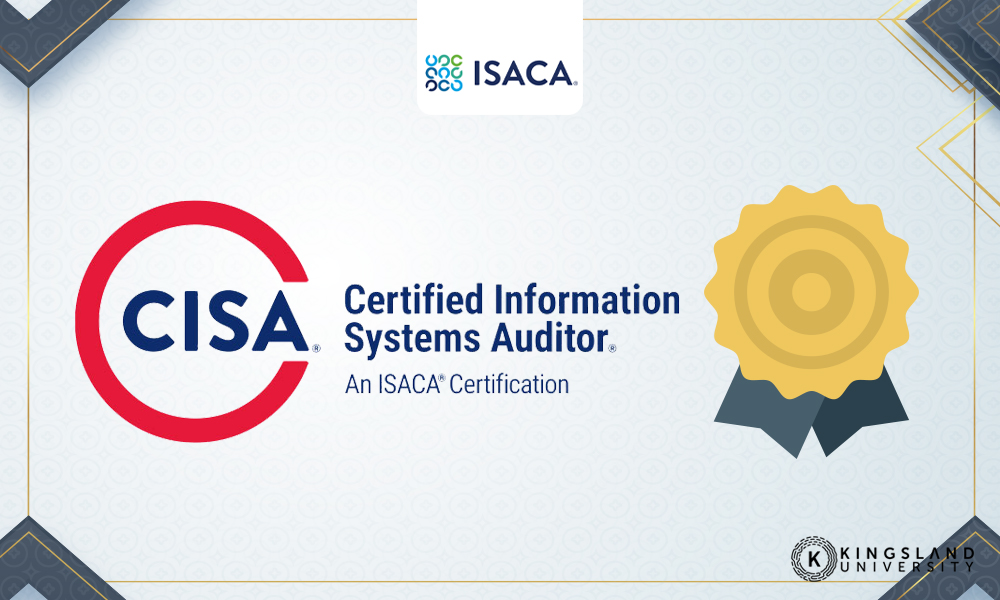
The main website on which to register for the course and exam alike is the ISACA website, which offers the exam for members and non-members of the website alike. Non-members are charged $760.00 to take the exam while members enjoy a discounted $575.00 price tag to take it. The price tag certainly might seem daunting, but the benefits allow an improved chance of employment for the following positions:
- IT Audit Manager with an average salary of $107,672.00 per year.
- Cybersecurity Auditor with an average salary of $86,608.00 per year.
- Information Security Analyst with an average salary of $98,562.00 per year.
- IT Security Engineer with an average salary of $105,674.00 per year.
- IT Project Manager with an average salary of $101,952.00 per year.
- Compliance Program Manager with an average salary of $98,894.00 per year.
While this certification is not as difficult to obtain as some other certifications, it can work wonders for you if your goal is to enter an IT-oriented cybersecurity position. Like all certifications, the CISA certification will serve as a major boon to all employment attempts you make in your field.
Certification #3: Certified Information Security Manager (CISM)
The Certified Information Security Manager (CISM) certification is less about direct interaction with actual software and hardware and is more business-oriented. The certification is designed for those in the cybersecurity field looking to transition into a managerial position and instead regulate the office rather than work for it. To qualify for and succeed at the course, applicants are required to have had a minimum of five years of professional experience in information security management with a degree potentially standing in for one or two years of experience.
The CISM teaches applicants about Information Security Governance, Information Risk Management, Information Security Program Management and Development, and Security Incident Management.
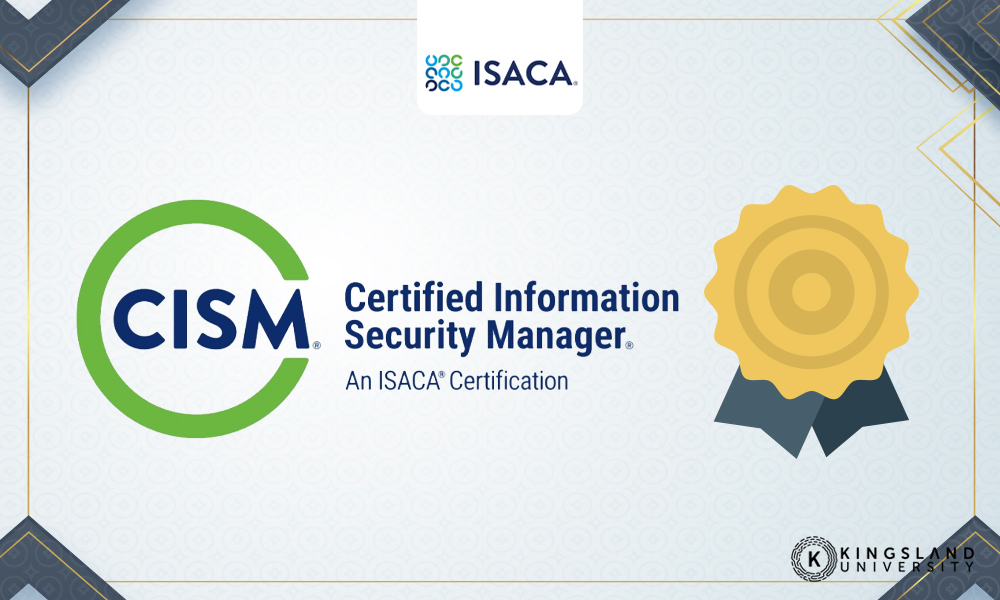
Like the CISA exam, the CISM exam features 150 multiple choice questions with a maximum score of 800 points. To pass the exam, you need a score of at least 450 points. The CISM certification also shared the same host site and price tag as the CISA certification, including the member discount provided by ISACA. The opportunities it provides are quite different, however:
- IT Manager with an average salary of $107,703.00 per year.
- Information Systems Security Officer with an average salary of $95,836.00 per year.
- Information Risk Consultant with an average salary of $91.023.00 per year.
- Director of Information Security with an average salary of $154,605.00 per year.
- Data Governance Manager with an average salary of $118,815.00 per year.
While the CISM certification is less technical than the other certifications we have listed here, it is no less valuable. It can be an extremely valuable asset if you are looking to establish a firm of your own or climb up the ladder of the one you currently work for. It can even help you get a managerial position at a firm right off the bat.
Certification #4: Certified Ethical Hacker (CEH)
The Certified Ethical Hacker (CEH) is a coveted yet equally difficult certification to earn due to the moral ambiguity behind the hacking, even for the right reasons. As the name implies, this certification teaches applicants to be able to do just that by maximizing their understanding of hacking to serve legal purposes.
The CEH certification explains the outline of ethical hacking and vital technical skills such as scanning networks, vulnerability analysis, and sniffing. These skills help to better enhance one’s ability to understand systems to exploit their weaknesses. The requirements to enroll in the course involve having two years of professional experience or completing specialized EC-Council training.
The exam for the CEH certification is a 4-hour test consisting of 125 multiple-choice questions. Unlike the other certification exams that we have discussed, the CEH exam uses a percentage-based score when evaluating whether someone passed or failed with passing scores ranging from 60% to 85%, depending on the exact testing form provided.
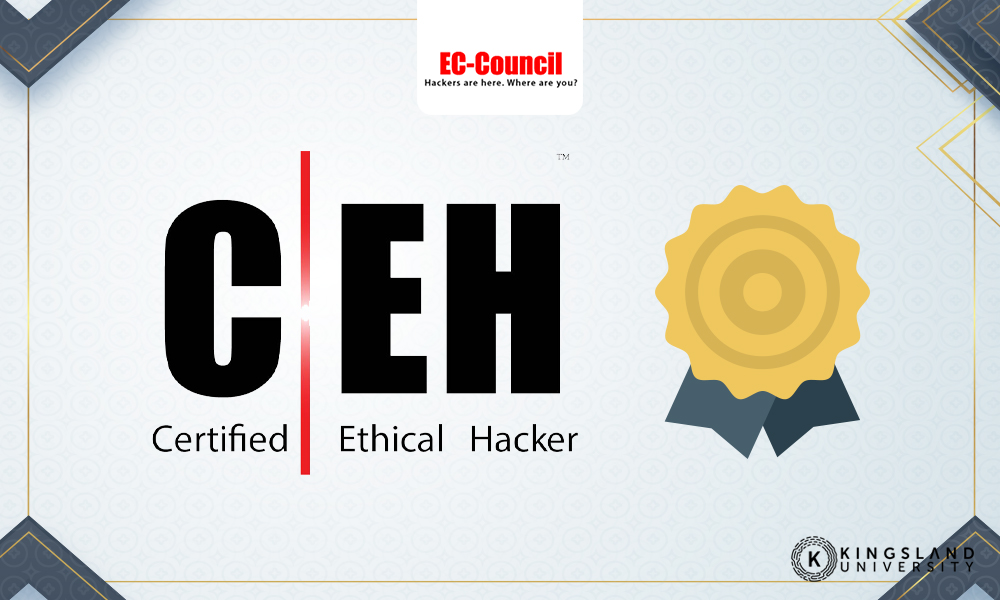
You can enroll in the course and register for the exam by signing up on the EC-Council website. Unlike the other providers, the cost for enrollment varies based on your location, starting at $950.00 and going up to $1,199.00 maximum. The most expensive certification we have listed comes with the added benefit of offering some valuable opportunities:
- Penetration Tester with an average salary of $102,811.00 per year.
- Cyber Incident Analyst with an average salary of $98,562.00 per year.
- Threat Intelligence Analyst with an average salary of $89,681.00 per year.
- Cloud Security Architect with an average salary of $157,164.00 per year.
- Cybersecurity Engineer with an average salary of $99,658.00 per year.
On top of all these opportunities, the CEH certification opens doors for positions in federal agencies dedicated to combating cybercrimes. These crimes are extremely difficult to combat and require advanced training to even come close to being on par with hostile hackers. The CEH certification is a coveted certification due to its vast opportunities and potential for expansion in the law enforcement field.
Certification #5: Systems Security Certified Practitioner (SSCP)
The Systems Security Certified Practitioner (SSCP) certification is an advanced security certification focusing on monitoring, designing, and implementing IT infrastructure. Like other advanced certifications, this credential is more difficult to obtain and therefore more valuable.
The SSCP certification educates applicants on Access Controls, Risk Identification, Security Administration, Cryptography, and Network. It requires applicants to have at least one year of professional experience in at least one testing subject.
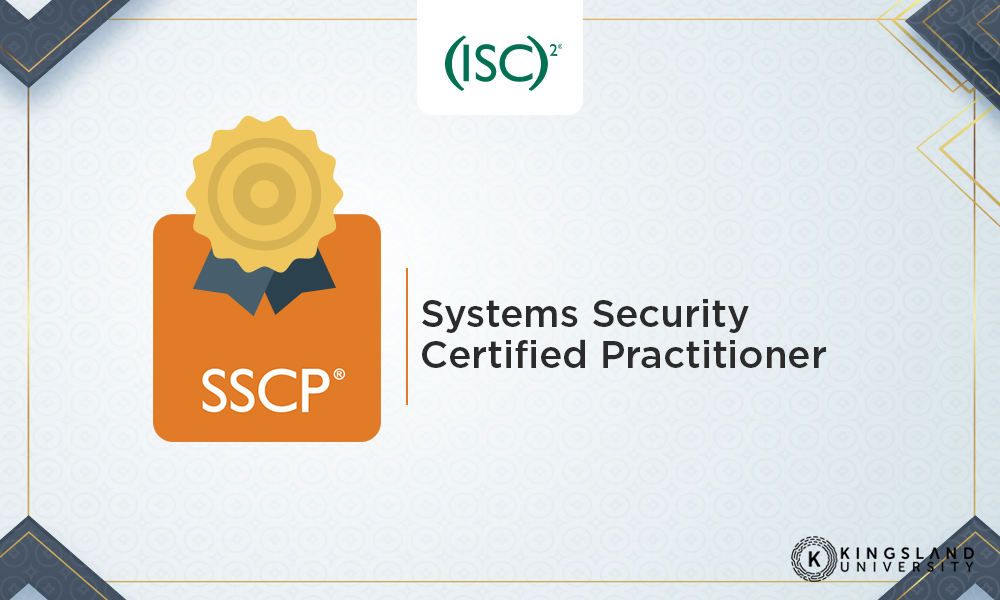
Hosted on the (ISC)2 website, applicants can enroll in the course and register for the exam for $249.00. The opportunities available to those with this credential include:
- Network Security Engineer with an average salary of $95,248.00 per year.
- System Administrator with an average salary of $74,817.00 per year.
- Systems Engineer with an average salary of $90,182.00 per year.
- Security Analyst with an average salary of $77,320.00 per year.
- Database Administrator with an average salary of $81,437.00 per year.
- Security Consultant with an average salary of $96,599.00 per year.
The qualifications that come with the SSCP certification allow for a more expansive yet similar opportunity one might find with the CISM or CISA certifications but help to reinforce your existing professional skills.
Wrapping Up
Certifications do not guarantee employment but serve as a boost to your qualifications by expanding your existing skillset and showing prospective employers that you are dedicated to learning more about your field. The certifications for cybersecurity are no different, even though some employers only consider applicants with specific certifications to ensure they are the most qualified for the position.

Cybersecurity is an expanding field with a shortage of qualified professionals available to fill positions, making it a less competitive field for its type. This is not to say that it is easy to seek employment in cybersecurity and not face steep competition. It merely means that the qualifications you do need are more extensive to stay relevant to prospective employers.
Be it for positions in IT, ethical hacking, or direct information security, certifications exist to bolster your skillset and show your future employer that you are dedicated to your field.


